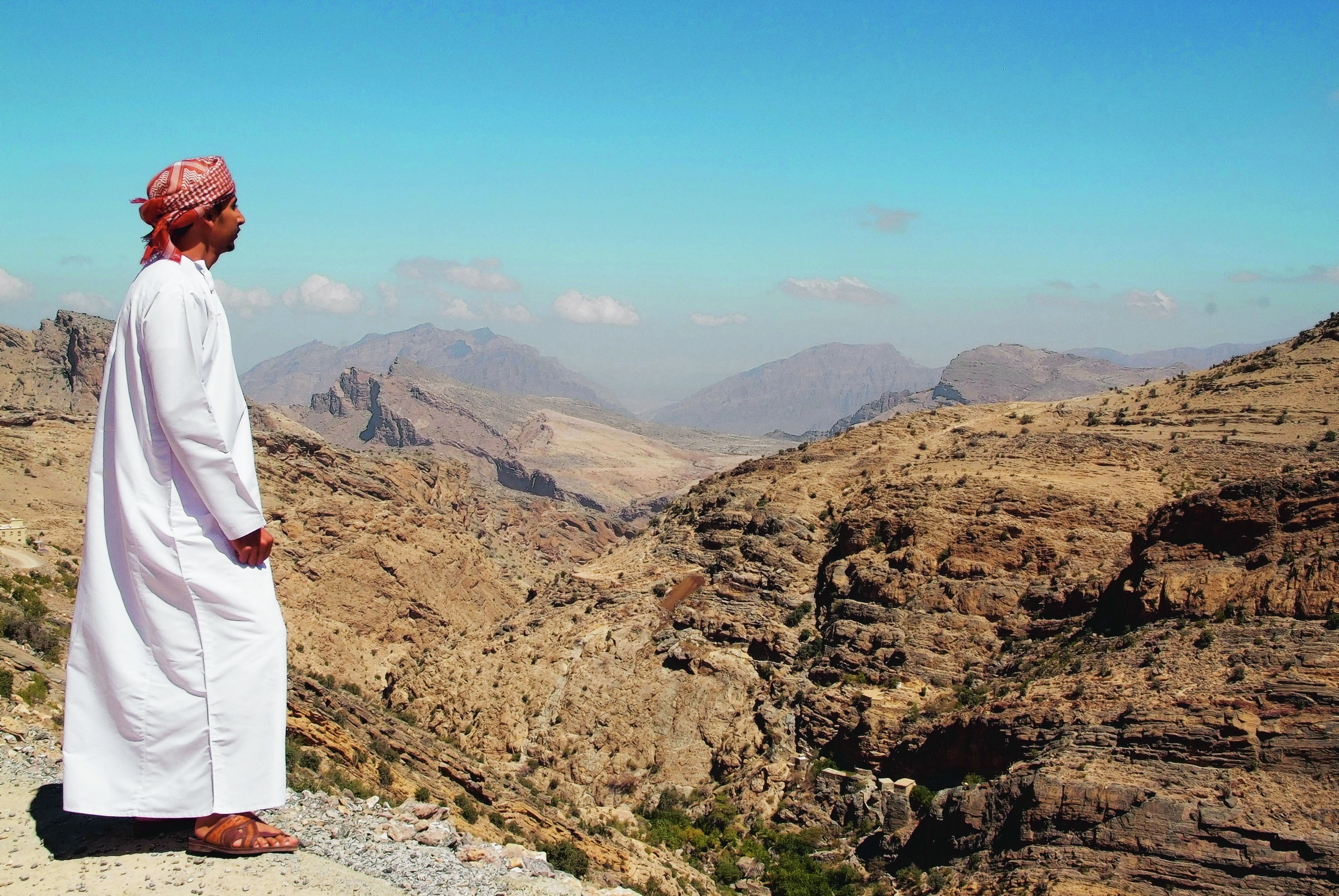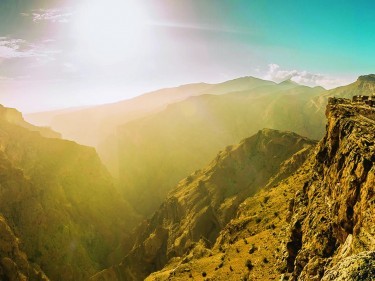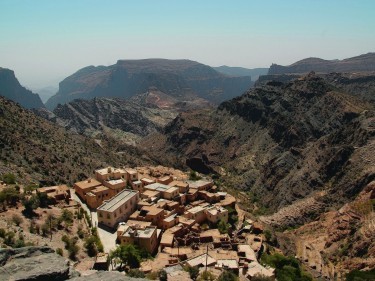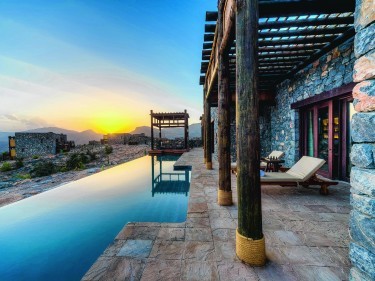Far from the glitz and glamour of the more famous emirates, Hannah Stephenson visits a luxurious new retreat in north Oman’s Al Hajar Mountains
Welcoming us into his majlis, a private meeting room for guests, we sit cross-legged on the carpeted floor while our guide Salim extracts the seeds from some pomegranates he’s just picked from his garden to give to us.
This colourful fruit is a staple in Oman, along with dates, which he also hands out, showing us how to remove the stone with our thumb in one swift movement and advising us to knead the date between thumb and forefinger to improve its flavour. I end up in a sticky mess – it obviously takes some practice.
Here, in the quiet of the Al Hajar Mountains in north Oman, you could be a million miles away from the glitz, glamour and opulence of neighbouring Dubai, a tourist destination six hours’ drive away, which has become the watchword for high-rise decadence and expensive sheen, a haven for ex-pats and tourists who want to enjoy the best luxury in the world and the fast, social whirr that goes with it.
Today, we’re in a much calmer, quieter place, as Salim takes us to a wadi (valley), where we weave our way through an orchard of ripe pomegranates, not a tourist in sight.
Walnuts are also in season when we are there in autumn, but we miss the colourful rose blooms which bring a riot of colour to the region in April, and provide a livelihood for inhabitants who make rose water to add to Omani coffee and sweets, and keep village houses sweetly scented.
Oman, the second-biggest country in the Arabian Gulf after Saudi Arabia, boasts mountains, desert, beach and history, as well as 1,635km of coastline fringing the Arabian Sea. So it’s surprising that British holidaymakers seeking adventure haven’t heard more about it.
Ex-pats and Emirate families living in neighbouring UAE and Saudi Arabia go camping in Jabal Akhdar (Green Mountain) in the Al Hajar mountain region, a spectacular and relatively undiscovered area where villages cut into the sandstone and limestone rock have existed for centuries, undiscovered by tourists until very recently.
DIANA’S VIEWPOINT
Yet there are things to see. There’s Diana’s Viewpoint, named after the late Princess of Wales who visited in 1986. Apparently, she was friends with the Sultan and had been camping nearby. We were unable, however, to see the spot as they’re building a new hotel where she once stood.
And there’s Nizwa, the second biggest city after the capital Muscat and home of a famous historical fort, where you can find an animal market, a silver souk and pottery stalls.
There are plans to create mountain-biking trails, caving experiences, off-roading and abseiling activities in the mountains, but for now, although several hotels are being built, Jabal Akhdar remains relatively untouched by tourism.
The main mountain road only opened in 2005 and its checkpoint at the base is manned by police who will only allow 4×4 vehicles in because of the steep gradients. There’s not much traffic, but watch out for wild donkeys and goats crossing the road.
In the mountains, you immediately get a sense of the hardship of the past in this raw and unforgiving terrain in all temperatures, from the searing heat of summer to the freezing winter, when snow is always a possibility.
Hiking through a rocky outcrop with another guide, Ali, I am shown a deserted village built on the edge of a steep hill, comprising simple huts made of local stone and mud, similar to a dry stone-walling process.
Here, the villagers would gather under the shade of the juniper, wild olive and acacia trees, always near a wadi where there would be water for at least some of the year. An exchange system was the norm for the goat shepherds and neighbouring farmers and bee keepers. Donkeys provided the transport for the heavy goods. This primitive existence only ended some 15 years ago, Ali informs us.
“Tough nature makes tough people,” he says, when I ask him how the older generation coped with the harsh conditions and high altitude (we are more than 2,200m up and the air is thin).
In summer, villagers slept outside and over the years, they carved terraces into the mountain to grow garlic, horseradish, tomatoes, walnuts and pomegranates, while in the freezing winter they lived on ghee and honey. If they farmed at levels of 1,200m or lower, they could also grow date palm and apricots.
After a civil war in the 1950s between the Imam of Oman, who controlled the interior of the country, and the Sultan, who claimed sovereignty and ruled the coastal area, including the capital Muscat, Jabal Akhdar was captured by the Sultanate in 1959.
Oman is now enjoying a golden age, with better education and health programmes, Ali says. Yet it was only in the late 1990s when the Sultan provided mountain villagers with slightly more sophisticated housing than their rocky shacks, setting up nearby houses with running water and electricity, but close enough to the old villages that the inhabitants could continue their farming practices.
Today, the mountains remain well protected. Only Omanis who were born in the mountains can own a property there, so hotels will have to tread carefully. The beautiful new Alila Jabal Akhdar spa hotel we are staying in is a joint venture between a local landowner and Alila, which is managing it.
SENSATIONAL VIEWS
A two-and-a-half hour drive from Muscat, the hotel is dramatically perched on a cliff edge, overlooking a stunning gorge with sensational views.
Alila has been careful in designing the hotel to match the rugged surroundings, employing local masons using traditional methods to construct the building out of local stone.
The scent of aromatic frankincense, from indigenous trees, wafts through the foyer, while the decor inside also represents all things Omani, from woven circular mats traditionally made from date palm fibre which adorn the walls and were used to sit on in the majlis, to the authentic pottery, paintings and hand-painted stencils of juniper leaves (the juniper tree is indigenous to the mountain range and its components used to make medicine). The library is filled not only with books about Oman but also relics from its history and fossils from the mountains.
As well as the peace and solitude enjoyed in this mountain setting, the more temperate climate in Jabal Akhdar, which is around 10 degrees cooler than the coast, will give this part of Oman a longer tourist season, as elsewhere the heat is pretty unbearable from May to September, with temperatures reaching 40-50C.
Back at the spa, I relax with a massage and later stimulate my mental senses with a Tibetan sound balancing treatment, where a therapist assesses my chakra flow by balancing heavy bowls on various parts of my body and taps the bowl with a wand, which can reveal through the vibrations what energy is blocked and what isn’t.
But for me, just a view of the mountains is therapy enough.
My fear is that the undiscovered treasure of the Al Hajar mountain range may all too soon become a pot of tourist gold – but Salim is adamant that visitors will not be allowed to spoil the view.
“Change is good, but we will continue to support the culture, the history and the customs of Oman,” he says. “We want to live the modern life, but we need to think globally, live locally.”
THE HOLIDAY
Hannah Stephenson was a guest of Alila Jabal Akhdar (www.alilahotels.com/jabalakhdar). Room rates start from £331 based on two sharing, including breakfast.
Oman Air offers daily direct non-stop flights to Muscat from London Heathrow. Return economy tickets start from £628 and business-class tickets from £2,569, including taxes and pending availability.



